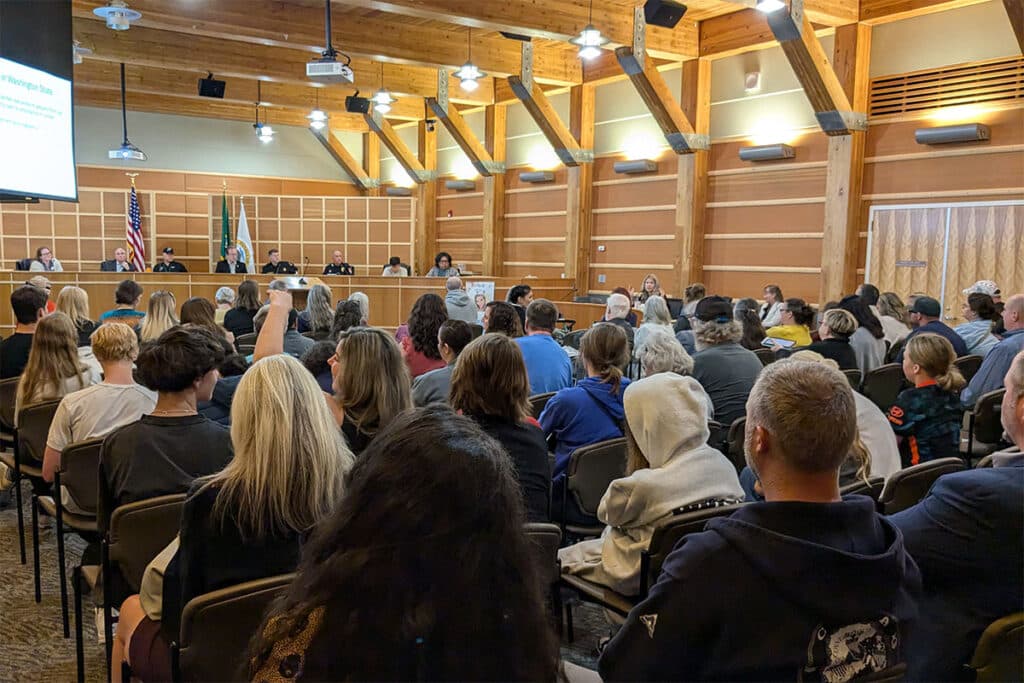Community Education Health & Wellness Police & Fire
Locals share personal stories of fentanyl crisis at town hall meeting
One man stepped up to the podium and spoke at length about his history with addiction, incarceration and path to sobriety. A mother spoke about how her child died after being peer-pressured. Another parent said his teenage daughter just celebrated 90 days free of drugs.
Health & Wellness Sponsor
Health and Wellness stories are made possible in part by Virginia Mason Franciscan Health, a proud sponsor of Gig Harbor Now.
These were a few of the stories shared during the Facing Fentanyl Town Hall, a well-attended conversation around the fentanyl crisis held Monday night at the Gig Harbor Civic Center. During the more than one hour long meeting, experts and residents offered a candid and sorrow look at how fentanyl and opioids harm the community.
Under the tagline “One Pill Can Kill,” the meeting sought to dispel rumors about fentanyl while emphasizing its potency and widespread impact across the economic spectrum.
“I hear from people (fentanyl) couldn’t affect our community here in Gig Harbor,” Dr. Nathan Schlicher, an emergency room physician and former state legislator, said to open the meeting. “We’re too wealthy. We’re too privileged. We don’t have those kinds of elements in our community.”
“What I’ll tell you is everyone is affected,” he continued. “It doesn’t discriminate, it doesn’t pick or choose only one group. It hits all of us.”

A crowd packed the Civic Center in Gig Harbor on Monday, Oct. 7, for the Facing Fentanyl town hall. Photo by Conor Wilson
Severity in Gig Harbor
The meeting in Gig Harbor — which precedes a similar one later this month on the Key Peninsula — comes as deaths from opioids have grown over much of the last decade, particularly since the pandemic. Prescription opioids originally drove the crisis, Schlicher said. But fentanyl, a synthetic opioid that is about 50 times stronger than heroin, took over as the catalyst.
Dr. Len Tran, an emergency room medical director at St. Anthony Hospital in Gig Harbor said his facility sees an opioid-related concern from a patient about eight of every 10 days on average. Fentanyl is responsible for about one-quarter of those. Substance abuse visits happen daily.
“It’s an epidemic in our nation,” he said. “Our community and our city and our area are not immune.”
Washington was one of a few states where opioid overdose deaths rose in 2023, according to preliminary data from the Centers for Disease Control. That bucks a national decline. Opioid-related deaths statewide are growing most quickly among people ages 18 to 24.
Gauging the effect in Gig Harbor specifically is difficult. But overdoses remain the leading cause of preventable death among adults in Pierce County, according to Chantell Harmon Reed, director of public health for Tacoma Pierce County Health Department. In 2022, 257 people died from an opioid overdose in Pierce County, according to data from TPCHD.
‘Why can’t they just stop’
Schlicher joined an 8-person panel of experts assembled to answer questions about opioids. That included officials from the Peninsula School District, Gig Harbor Police, Gig Harbor Fire and Medic One, the health department and St. Anthony Hospital.
One of the first questions to the panel was: Why can’t drug users just quit? Experts widely agree addiction is a chronic illness accompanied by significant changes to the brain, not the result of moral failure or an unwillingness to stop.
“It is easy for us to judge at times,” Schlicher said. “Some of us are perfect — I’m not one of them — but most of us have a problem that we are working to overcome. I would say that any substance is in that category. Some of them like fentanyl, just rip you harder, quicker and longer.”
A man in the audience described himself as five years sober after over a decade of drug use and time in jail. He said although he wanted to quit, he was fearful of facing reality.
“I wanted to be really bad, really really bad and (was) constantly feeling bad about myself for using. But then I abused (drugs) because I felt so bad and it was a constant war within my own body,” he said. “I ended up trying to kill myself. Obviously it didn’t work, but I was so deathly afraid of sobriety.”
One pill can kill
Fentanyl is unique in that a comparatively small dose can be lethal. Two milligrams, depending on the person’s size, tolerance and history, can be deadly, according to the U.S. Drug Enforcement Agency.
Panelists said any substance use comes with risk. Most people survive after a single use of recreational drugs, but caution is not a guarantee. A parent in the audience said their son, who died in January, did not have a history of substance use. A peer pressured him into taking opioids.
“One friend pushed him into it and I never get to see him again,” she said.
Jeremiah Saucier, director of Crossroad Treatment Center, a nonprofit that works with PSD schools, said fortunately they have not seen a lot of fentanyl use among students. Their main concerns are cannabis or alcohol. But he cautions drugs, including marijuana, obtained outside of a pharmacy or dispensary still carry risks. The substances could be tainted with fentanyl.
“That is our biggest worry,” he said. “If you’re not getting it from a dispensary, in a package, I’d be very careful.”
Opioids in schools
Peninsula School District provides opioid education classes to every high school student through a partnership with the Crossroads Treatment Center and U.S. Public Health Services. Under state law, school districts are also required to keep naloxone, a drug that can reverse an opioid overdose, on hand at their schools.
Medical providers say young adults who need treatment for substance abuse or mental health should see a medical provider, who will keep information they share confidential. Becky Maffei, a district counselor, encouraged parents to continue to talk to their children about their expectations around drug use.
“One thing that we actually know is that teenagers do listen to their parents,” she said. “They don’t listen to everything they say, but lots of research shows that it’s really important to talk to your kids and to make it clear where you stand on things.”


